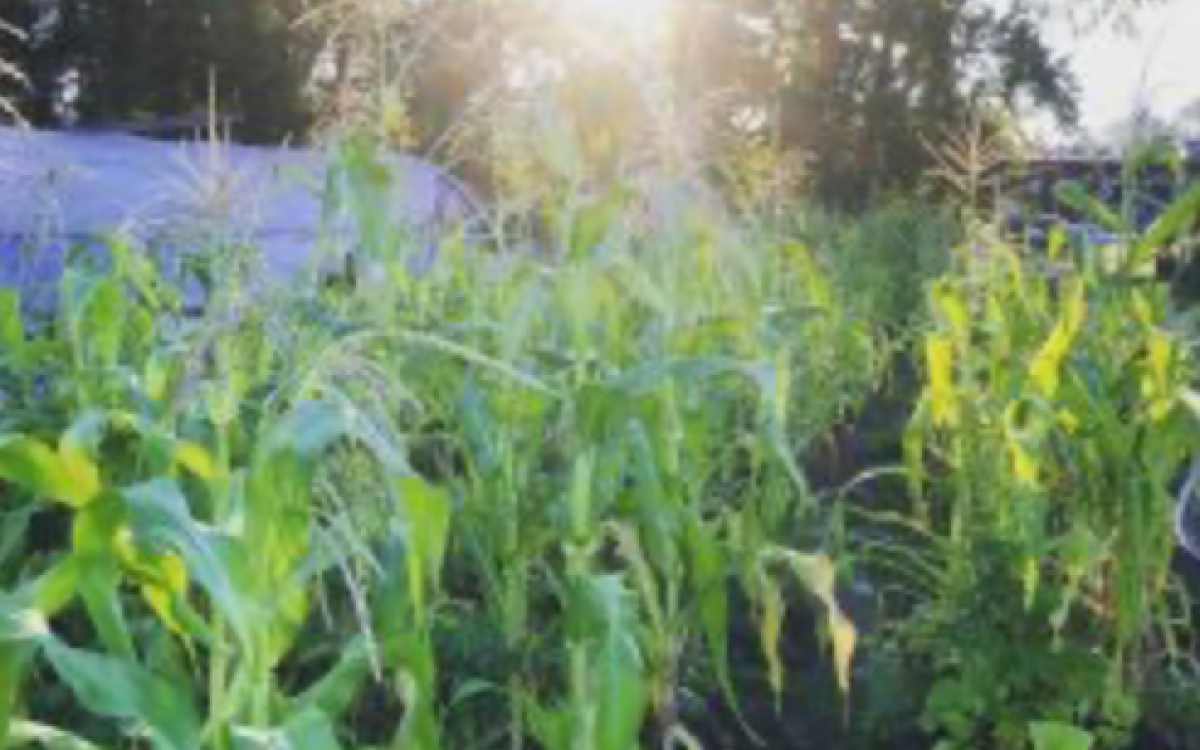At a glance
Funding from the Resilience Lab & CSF would lay the foundation for a “Cultural Kitchen” and Gathering Garden, more… Read full summary
- Funding received
- 2020-2021
- Mini
- Awarded
- $3,000
- Funding partners
-
- Services and Activities Fee (SAF)
Funding from the Resilience Lab & CSF would lay the foundation for a “Cultural Kitchen” and Gathering Garden, more than doubling the size of the current Native Garden at the UW Farm, creating a place where traditional methods of fish preparation and the planting, growing, harvesting, and processing of plants can be shared, along with the Indigenous knowledge and stories behind them.
The University of Washington (UW) Farm, located in Seattle on Coast Salish land, is emerging as a lifeline to support student food security. As a partner to wǝɫǝbʔaltxʷ, a longhouse-style facility on the UW Seattle campus which provides a learning and gathering space for American Indian and Alaska Native peoples, the UW Farm also strives to promote Indigenous food sovereignty. The small Native Garden currently on-site has the potential to act as a pathway to a significant program which would honor, foster, and support Indigenous leadership in sharing traditional ecological knowledge and cultivating sustainable food systems. As the UW Farm grows in community and collaboration with wǝɫǝbʔaltxʷ, powerful pedagogical connections with land and place become ever more apparent. This proposal aims to encourage resiliency, diversity, and healing by developing intergenerational land-based learning about traditional foods and practices that promote Indigenous community ownership and decision-making throughout the food system.
Pre-COVID, 25% of university students were food insecure and a 2018 report found 33% of students "sometimes" or "often" could not afford balanced meals. As a group, 25% of American Indians reported food insecurity, compared with 11% of U.S. households. Due to COVID, estimates suggest these numbers are doubling across the nation, and particularly for Indigenous communities, People of Color, and low-income households. The UW Farm, covering only 1.5 acres, has donated over 2,200 pounds of fresh produce to the UW food pantry in 2020 and regularly supplies produce to nearly 200 households each week. The Native Garden, which began in 2017 with funding provided by wǝɫǝbʔaltxʷ, has grown, with produce directed to First Nations students and toward traditional events, including the annual "Taking Back The Dinner", and Seed Saving of rare indigenous crops.
In 2018, the wǝɫǝbʔaltxʷ - Intellectual House partnered with the UW Farm to create the wǝɫǝbʔaltxʷ Native Garden, a plot dedicated to growing traditional foods utilizing Indigenous growing practices and ways of knowing. This partnership has become the Indigenous Food Pathway Program whose mission is to create spaces where students, staff, faculty, and community members can learn about, grow, and consume traditional food. Aims include advancing food security, self-determination, and holistic health all of which are critical to revitalizing Indigenous lifeways and decolonizing food pathways at UW.
Funding from the Resilience Lab & CSF would lay the foundation for a “Cultural Kitchen” and Gathering Garden, more than doubling the size of the current Native Garden at the UW Farm, creating a place where traditional methods of fish preparation and the planting, growing, harvesting, and processing of plants can be shared, along with the Indigenous knowledge and stories behind them. A strength and irreplaceable component of Indigenous teaching is the inclusion of Elders as educators. The installation of permeable ADA accessible trails at the main site will help facilitate participation by Elders from Washington tribes, as well as encourage engagement of community members and students with disabilities. Growing a Gathering Garden that is welcoming and accessible to all will lead to a living food, fiber, and medicine pathway to food sovereignty, healing, and connection, making plain the vision of land as teacher and partner in education.
In addition to supporting food security, the proposed expansion of this space cultivates soil and community health through holistic exploration of traditional farming and food system practices, plant and seed conservation, and Indigenous food systems. Leadership and collaborators on this project include Tribal Elders, members of the UW Indigenous communities, the wǝɫǝbʔaltxʷ, members of the Native American Advisory Board at the Burke Museum, and faculty from UW’s Nutritional Sciences Program, Program on the Environment, and School of Environmental and Forest Sciences. This project will grow the existing collaboration between the UW Farm and wǝɫǝbʔaltxʷ, allowing us to holistically explore traditional farming practices, plant conservation (especially the cultivation and production of endangered seeds), history, and the importance of elevating First Nations. This kitchen would act as a gathering place for community and educational events including a seminar series to be hosted jointly among UW programs. Over time, this partnership will support resiliency, diversity, and healing through intergenerational land-based gatherings with traditional foods and practices to promote community ownership throughout the food system.
Iisaaksiichaa Ross Braine
Project lead
- dabraine@uw.edu
- Affiliation
- Staff
- Affiliated groups
- Office of Minority Affairs & Diversity
